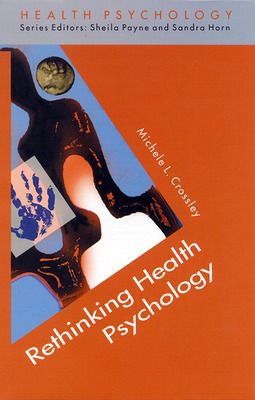Rethinking Health Psychology
1st Edition
0335231292
·
9780335231294
© 2000 | Published: October 16, 2000
* What are the main theories, methods and applications relevant to the study of health and illness from a psychological perspective?* In what ways can contemporary health psychology be critically 'rethought'?* What are the implications of this 'rethi…
Read More
Request More Info
After you purchase your eBook, you will need to download VitalSource Bookshelf, a free app or desktop version here. Then login or create an account and enter the code from your order confirmation email to access your eBook.
- Access the eBook anytime, anywhere: online or offline
- Create notes, flashcards and make annotations while you study
- Full searchable content: quickly find the answers you are looking for
Series editors' foreword
Acknowledgements
Opening thoughts
Approaches to health psychology
Health and illness in contemporary society
Rethinking psychological approaches to health promotion
Mainstream health psychology's study of pain and disease
Critically re-formulating the study of pain and disease
Approaches to mental illness
'Managing' illness: relationships between doctors and patients
Living in the face of death
Concluding synopsis
Bibliography
Index.
Acknowledgements
Opening thoughts
Approaches to health psychology
Health and illness in contemporary society
Rethinking psychological approaches to health promotion
Mainstream health psychology's study of pain and disease
Critically re-formulating the study of pain and disease
Approaches to mental illness
'Managing' illness: relationships between doctors and patients
Living in the face of death
Concluding synopsis
Bibliography
Index.
* What are the main theories, methods and applications relevant to the study of health and illness from a psychological perspective?
* In what ways can contemporary health psychology be critically 'rethought'?
* What are the implications of this 'rethinking' for the future of health psychology?
This introductory text presents a coherent overview of prevalent theories, methods and applications within contemporary health psychology. In particular, it provides a critical analysis of mainstream health psychology by drawing on newer approaches such as discourse, narrative, postmodernism and material discursive analysis. In this way, the largely decontextualized, individualist and cognitively-orientated field of health psychology is brought up to pace with critical developments in other areas such as social psychology. These theoretical ideas provide the basis of the book's main thesis: that contemporary health psychology needs to be rethought.
After presenting an overview of the different theories and methods associated with mainstream and newer approaches within health psychology, the application of these approaches is logically and critically pursued across a range of substantive areas. These include: 'risky' health-related behaviours such as eating, alcohol and drug use, exercise and sex; health promotion related to these 'risky' behaviours; living and coping with chronic illnesses; mental health and illness; communicating and relating with health professionals; and living with dying. Finally, this book locates the growing popularity of health psychology within the contemporary social and political context, particularly in relation to recent changes in the way health care is organized and the commodification and commercialization of health and lifestyles.
* In what ways can contemporary health psychology be critically 'rethought'?
* What are the implications of this 'rethinking' for the future of health psychology?
This introductory text presents a coherent overview of prevalent theories, methods and applications within contemporary health psychology. In particular, it provides a critical analysis of mainstream health psychology by drawing on newer approaches such as discourse, narrative, postmodernism and material discursive analysis. In this way, the largely decontextualized, individualist and cognitively-orientated field of health psychology is brought up to pace with critical developments in other areas such as social psychology. These theoretical ideas provide the basis of the book's main thesis: that contemporary health psychology needs to be rethought.
After presenting an overview of the different theories and methods associated with mainstream and newer approaches within health psychology, the application of these approaches is logically and critically pursued across a range of substantive areas. These include: 'risky' health-related behaviours such as eating, alcohol and drug use, exercise and sex; health promotion related to these 'risky' behaviours; living and coping with chronic illnesses; mental health and illness; communicating and relating with health professionals; and living with dying. Finally, this book locates the growing popularity of health psychology within the contemporary social and political context, particularly in relation to recent changes in the way health care is organized and the commodification and commercialization of health and lifestyles.

